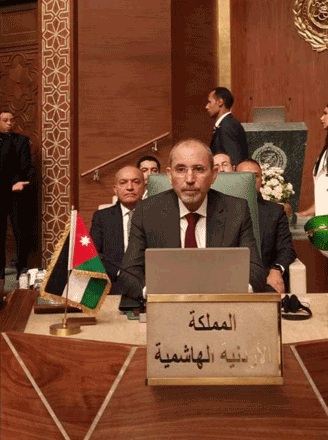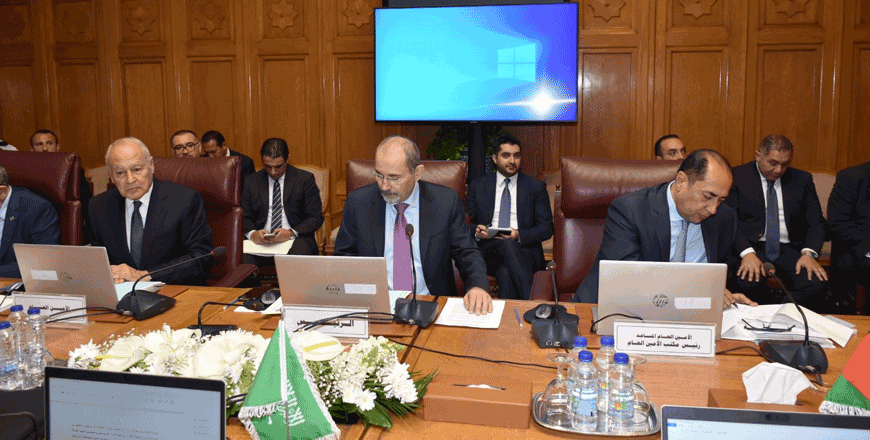You are here
FM attends 160th session of Arab League Council of Ministers in Cairo
By JT - Sep 06,2023 - Last updated at Sep 06,2023

Deputy Prime Minister and Foreign Minister Ayman Safadi attends 160th session of the Arab League Council of Ministers (Petra photo)
AMMAN — Deputy Prime Minister and Foreign Minister Ayman Safadi attended the 160th session of the Arab League Council of Ministers, which took place in Cairo and concluded on Wednesday.
The high-level officials deliberated on the coordination of stances regarding various regional and Arab issues, with a main focus on promoting stability, peace and comprehensive peaceful resolutions to pressing issues, foremost of which is the Palestinian issue.
Throughout the sessions, Arab ministers also discussed agenda items that pertained to upgrading mechanisms for joint Arab action, as well as ways to bolster multilateral cooperation with the aim of enhancing Arab-Arab relations and strengthening relations regionally and internationally.
Safadi, in a series of interventions during these sessions, reaffirmed Jordan's commitment to collective Arab endeavours and collaborative approaches in addressing the current regional and Arab challenges.
He stressed the importance of maintaining dialogue among Arab nations and the need to base the resolution of regional crises in political solutions, noting that such an approach contributes to regional stability, peace and security, and deters any escalation.
Preceding the commencement of the session, Safadi presided over the seventh meeting of the Arab Ministerial Committee associated with to countering the illegal Israeli policies and actions in occupied Jerusalem.
Safadi emphasised Jordan's unswerving efforts, led by His Majesty King Abdullah, to safeguard the holy Islamic and Christian sites in Jerusalem.
He also drew attention to the committee's efforts to garner international support to put an end to Israel's unlawful activities and violations in occupied Jerusalem.
The discussions also underscored the importance of sustained Arab efforts and cooperation aimed at protecting Al Aqsa Mosque and the holy Islamic and Christian sites in occupied Jerusalem.
The need to lend support to the resilience of Palestinian Jerusalemites who face Israel's aggressive policies and practices, designed to alter the Arab, Islamic and Christian identity, historical and legal status quo, and to impose temporal and spatial divisions upon Al Aqsa Mosque/Al Haram Al Sharif, was emphasised as well.
The ministers voiced support for the Hashimite Custodianship over Jerusalem's Islamic and Christian holy sites.
In the concluding statement of their meeting, the Arab ministers affirmed a comprehensive action plan, including organising committee visits to influential countries and engaging with regional and international organisations to garner support for Palestinian rights and underline Israeli violations and practices.
Further, they called for initiating legal action and holding Israeli occupation authorities accountable for their violations and crimes in Jerusalem.
The communiqué also emphasised the need for tasking the League's missions and member state ambassadors on the committee with efforts related to exposing illegal Israeli practices in Jerusalem, while advocating for strong international stances against these practices.
They also called for delegating the Secretary-General to coordinate with member states to set the necessary mechanisms for committee action in motion, aligned with the contents of this statement.
Ahead of the 160th ministerial-level session of the Arab League Council of Ministers, Safadi took part in an open-membership Arab Ministerial Committee convened to support Palestine, under the chairmanship of Saudi Arabia. This committee included representatives from Jordan, Algeria, Palestine, Qatar, Lebanon, Egypt, Morocco, Mauritania and the Secretary-General of the Arab League.
Before the commencement of the 160th session, Safadi held discussions with his counterparts who were also participating in the session. These discussions centred on enhancing bilateral relations, coordinating stances and consulting on various regional and international issues of mutual interest.
Related Articles
AMMAN — Deputy Prime Minister and Foreign Minister Ayman Safadi on Tuesday participated in the first meeting of the Arab Ministerial Committ
AMMAN — Deputy Prime Minister and Foreign Minister Ayman Safadi on Thursday headed a meeting of the Arab ministerial committee tasked with i
AMMAN — Deputy Prime Minister and Foreign Affairs Minister Ayman Safadi on Wednesday in Cairo chaired the 6th meeting of the Arab Ministeria













